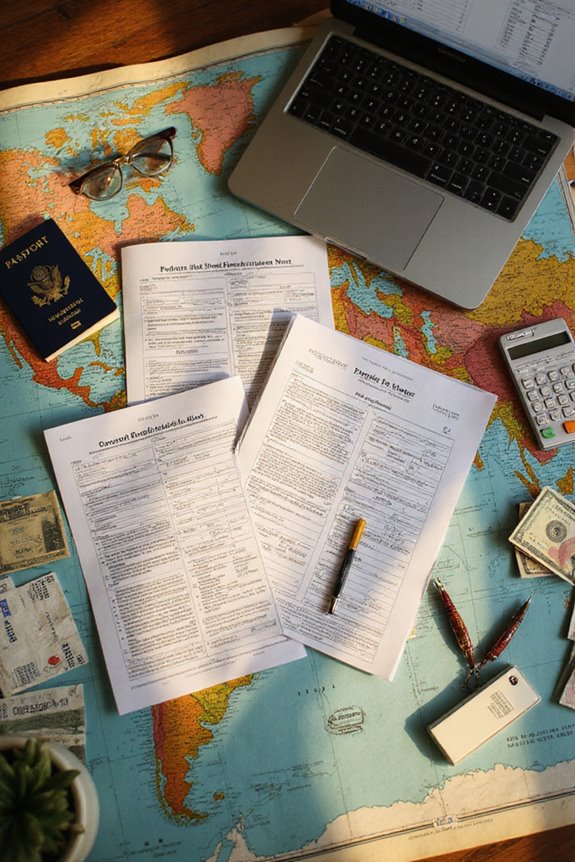As a perpetual traveler, I’ve learned that tax implications can get pretty wild! I still must file in the U.S., no matter where I roam. There’s the 183-day rule that can flip my residency status in some countries. Plus, some places have crazy tax laws that could turn double taxing into a nightmare. But hey, managing it can lead to amazing opportunities for savings! Stick around, and I’ll share more insights on maneuvering this global tax maze!
Key Takeaways
- U.S. citizens must report worldwide income and file taxes regardless of their location as perpetual travelers.
- The Foreign Earned Income Exclusion (FEIE) can provide tax relief but requires meeting specific criteria.
- Maintaining careful documentation of travel and physical presence is crucial to avoid becoming a tax resident in multiple countries.
- Navigating tax treaties between countries can help prevent double taxation, but understanding them is essential.
- Legal compliance and adaptability are vital to minimize penalties and ensure effective tax management while traveling.
Understanding the Concept of Perpetual Travelers

When it comes to the idea of being a perpetual traveler, you might think it sounds a bit dreamy—like living out of a suitcase while hopping from country to country. Well, let me tell you, it’s not just a fantasy; it’s a lifestyle! Perpetual travel lets me explore diverse cultures, from sipping espresso in Italy to wandering temples in Thailand, without the burden of long-term commitments. I love the idea of global citizenship, where I can pick and choose countries based on my needs—tax benefits, business opportunities, or simply the best weather. It’s about freedom and flexibility, really. I can pack up and leave at a moment’s notice, embracing life’s adventures while keeping it legal and within my control.
U.S. Tax Responsibilities for Perpetual Travelers

Living the life of a perpetual traveler sounds exhilarating, but there’s a little hiccup that comes with this freedom—U.S. tax responsibilities. As a U.S. citizen, I’m still obligated to file income tax returns, no matter where I roam. That means reporting worldwide income, which can feel like a heavy backpack I can’t leave behind! If I’m not careful and miss my filing, I could face penalties that rival bad airline connections. The Foreign Earned Income Exclusion (FEIE) might keep some of my income from being taxed, but I need to meet specific conditions. Keeping track of my presence in the U.S. is essential. So, I rely on solid compliance strategies, turning what could be a tax nightmare into a manageable journey.
Navigating Tax Residency Rules and Physical Presence Tests

Maneuvering tax residency rules and physical presence tests can feel like deciphering a secret code, especially when you’re constantly on the go. I can’t tell you how many times I’ve checked my calendar, counting days spent in each country to guarantee I don’t eclipse that 183-day threshold. Each country has its own quirky criteria—property, family ties, or even where I keep my favorite socks! It’s not just about where I am; it’s about how long I stay. Being careful means avoiding unwanted surprises at tax time. Plus, understanding my domicile helps frame these rules better. So, keep that travel journal handy; it’s not just for memories, it’s for proving your physical presence—or lack thereof!
Challenges in Utilizing Perpetual Traveler Tax Strategies

Maneuvering the world as a perpetual traveler, I often find myself entangled in a web of tax challenges that seem to multiply the farther I roam. One moment I’m opening a bank account, and suddenly, I’m hit with requests for proof of residency I don’t have. It’s frustrating! I dread the idea of becoming a tax resident in multiple countries, which can lead to double taxation. On top of that, traversing different tax treaties and compliance rules often feels like decoding ancient hieroglyphics. If I misinterpret something? Ouch—penalties await! Plus, the legal uncertainties keep me on my toes, making me wish for a solid base. Juggling these financial compliance requirements is a wild ride, but I wouldn’t trade this adventure for anything.
Advantages of the Perpetual Traveler Lifestyle

Though it might seem intimidating at first, the perpetual traveler lifestyle offers incredible advantages that make the challenges worth exploring. Imagine dodging hefty tax bills, thanks to clever tax optimization strategies; I’ve seen firsthand how avoiding tax residency can drastically lighten financial burdens. Plus, with constant movement, I tap into amazing global networking opportunities, connecting with folks who inspire new business ideas and open doors I never knew existed. Living in diverse markets lets me adapt and innovate without the constraints of a fixed location. It’s liberating! No local obligations or bureaucratic red tape means I can chase my dreams wherever they take me. Honestly, this lifestyle enriches not just my portfolio, but my entire life.
Record-Keeping and Compliance Obligations
When it comes to managing the ins and outs of record-keeping and compliance as a perpetual traveler, you quickly realize that a little organization goes a long way. Keeping thorough travel logs and having those entry/exit stamps is key; it’s like your passport to proving where you’ve been. I’ve found that retaining tax documentation, like W-2s and receipts for at least seven years, is just smart planning. Not to mention, having a fixed address can help with some countries’ residency requirements. I can’t stress enough how essential it is to track deadlines for various jurisdictions—you don’t want penalties creeping up on you. So, embrace the chaos, but remember, neat records can save the day!
The Role of International Tax Treaties and Agreements
After wrangling with record-keeping and compliance obligations, you might wonder how to navigate the murky waters of international tax obligations while living the perpetual traveler lifestyle. Thankfully, international tax treaties come to the rescue! These agreements lessen the burden of double taxation, offering treaty benefits that can save you cash on dividends, interest, and more. But here’s the kicker: residency rules can differ from what you’re used to. If you’re deemed a resident in two countries, tie-breaker rules can help determine where you owe taxes. For us wandering souls, understanding how to leverage these treaties is key to staying compliant while enjoying life with our backpacks, rather than worrying about tax bills popping up like weeds!
Seeking Professional Guidance and Advice
How on earth do you keep up with the whirlwind of tax laws and regulations when you’re constantly on the move? Honestly, I’ve learned that finding professional advisors is essential. They help navigate complex legal, tax, and immigration matters, ensuring I stay compliant without losing my mind. When I consult experts, I discover tailored tax strategies that make my life easier. For example, understanding residency rules and optimizing asset protection has saved me from unnecessary headaches and penalties. Ongoing support is important since laws change frequently; that insider knowledge keeps me ahead of the game. So, if you’re wandering the globe like me, don’t hesitate to seek guidance—it’s worth every penny to dodge tax-related turmoil!
Frequently Asked Questions
Can I Maintain a Bank Account While Being a Perpetual Traveler?
Yes, I can maintain a bank account while traveling. I’ve explored various bank account options, and it’s essential to keep my residency status updated to avoid complications like frozen accounts or unexpected fees.
What Expenses Can I Deduct as a Perpetual Traveler?
Steering travel expenses can feel like untangling a suitcase full of clothes. As a perpetual traveler, I’ve found that deducting items like lodging, meals, and local transportation really lightens the load on my taxes.
How Do Currency Fluctuations Affect My Tax Liability?
Currency fluctuations can really impact my tax liability. I’m constantly managing currency risk, so careful tax planning is essential. By tracking conversions accurately, I can mitigate unexpected changes in my reported income and tax obligations.
What Happens if I Inadvertently Become a Tax Resident?
If I inadvertently become a tax resident, I face significant implications. These inadvertent residency consequences can include higher tax rates and strict reporting obligations. It’s essential to manage my situation carefully to avoid penalties.
Are There Any International Tax Software Tools for Perpetual Travelers?
Steering through tax waters can feel overwhelming, but I’ve found tax software invaluable for maximizing traveler benefits. These tools simplify compliance, ensuring I stay ahead in my adventures without unnecessary financial worries or surprises.




